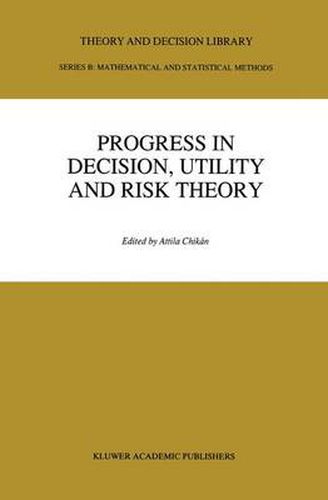Readings Newsletter
Become a Readings Member to make your shopping experience even easier.
Sign in or sign up for free!
You’re not far away from qualifying for FREE standard shipping within Australia
You’ve qualified for FREE standard shipping within Australia
The cart is loading…






This title is printed to order. This book may have been self-published. If so, we cannot guarantee the quality of the content. In the main most books will have gone through the editing process however some may not. We therefore suggest that you be aware of this before ordering this book. If in doubt check either the author or publisher’s details as we are unable to accept any returns unless they are faulty. Please contact us if you have any questions.
In this volume we present some of the papers delivered at FUR-IV - the Fourth International Conference on Founda tions and Applications of Utility, Risk and Decision Theory in Budapest, June 1988. The FUR Conferences have provided an appreciated forum every two years since 1982 within which scientists can report recent issues and prospective applications of decision theory, and exchange ideas about controversial questions of this field. Focal points of the presented papers are: expected utility versus alterna tive utility models, concepts of risk and uncertainty, developments of game theory, and investigations of real decision making behaviour under uncertainty and/or in risky situations. We hope that this sample of papers will appeal to a wide spectrum of readers who are interested in and fami liar with this interesting and exciting issues of decision theory. A wide range of theoretical and practical questions is considered in papers included in this volume, and many of them closely related to economics. In fact, there were two Nobel-Laureates in economics among the participants: I. Herbert A. Simon (1978) and Maurice Allais (1988), who won the prize just after the conference. His paper deals with problems of cardinal utility. After a concise overview of the history and theory of cardinal utility he gives an estimate of the invariant cardinal utility function for its whole domain of variation (i. e.
$9.00 standard shipping within Australia
FREE standard shipping within Australia for orders over $100.00
Express & International shipping calculated at checkout
This title is printed to order. This book may have been self-published. If so, we cannot guarantee the quality of the content. In the main most books will have gone through the editing process however some may not. We therefore suggest that you be aware of this before ordering this book. If in doubt check either the author or publisher’s details as we are unable to accept any returns unless they are faulty. Please contact us if you have any questions.
In this volume we present some of the papers delivered at FUR-IV - the Fourth International Conference on Founda tions and Applications of Utility, Risk and Decision Theory in Budapest, June 1988. The FUR Conferences have provided an appreciated forum every two years since 1982 within which scientists can report recent issues and prospective applications of decision theory, and exchange ideas about controversial questions of this field. Focal points of the presented papers are: expected utility versus alterna tive utility models, concepts of risk and uncertainty, developments of game theory, and investigations of real decision making behaviour under uncertainty and/or in risky situations. We hope that this sample of papers will appeal to a wide spectrum of readers who are interested in and fami liar with this interesting and exciting issues of decision theory. A wide range of theoretical and practical questions is considered in papers included in this volume, and many of them closely related to economics. In fact, there were two Nobel-Laureates in economics among the participants: I. Herbert A. Simon (1978) and Maurice Allais (1988), who won the prize just after the conference. His paper deals with problems of cardinal utility. After a concise overview of the history and theory of cardinal utility he gives an estimate of the invariant cardinal utility function for its whole domain of variation (i. e.